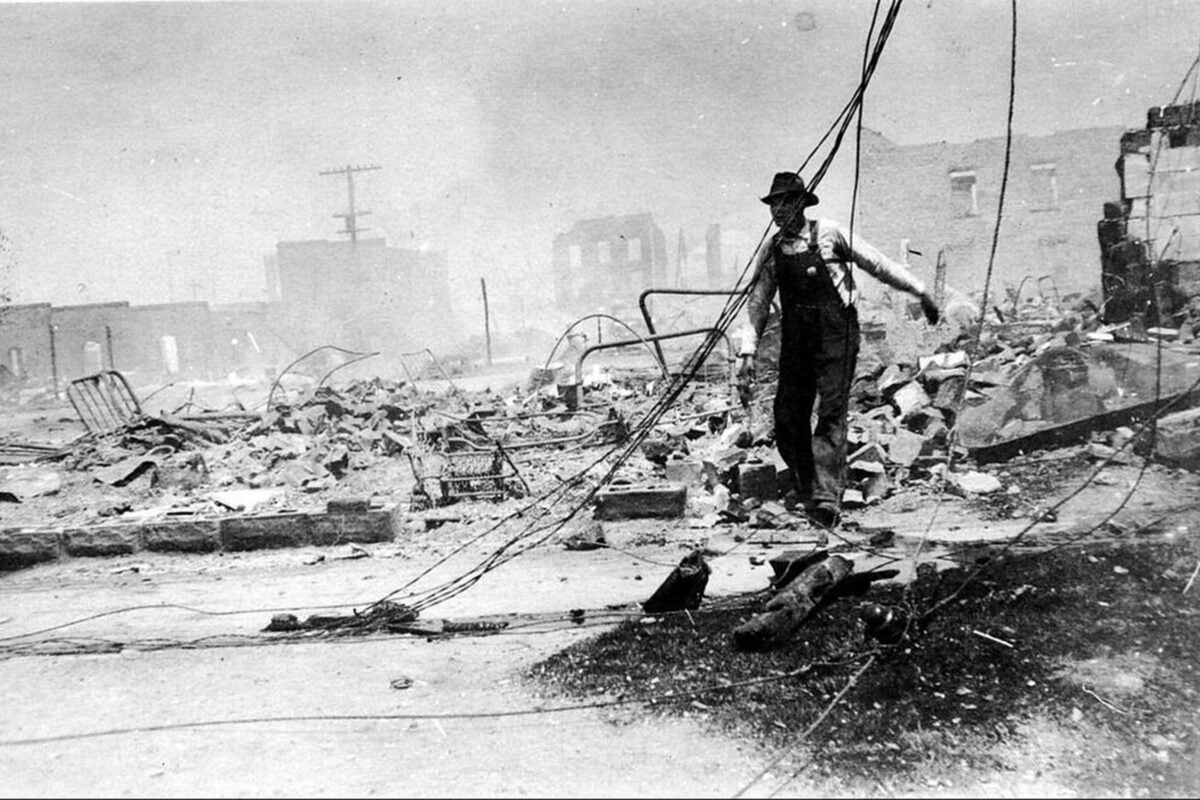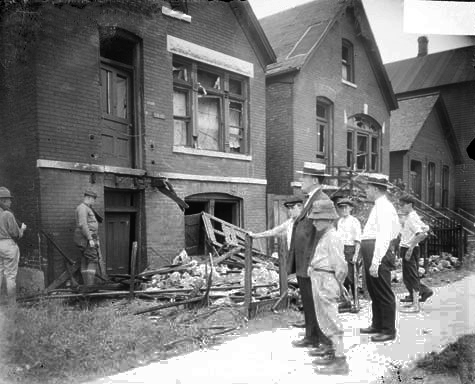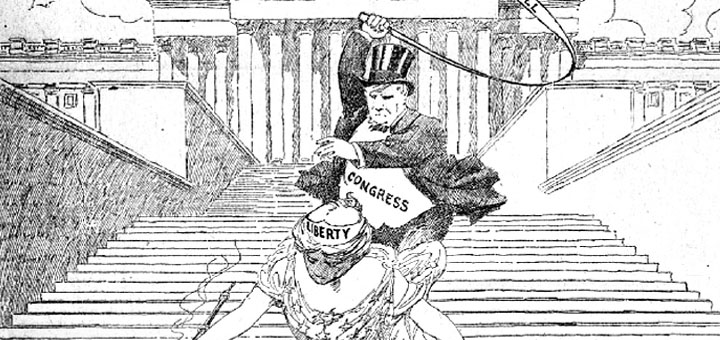“Arise ye pris’ners of starvation
Arise ye wretched of the earth” - The Internationale
Alexander Mitchell Palmer is a Quaker.
He is born a Quaker in 1872. And apparently he keeps the faith of his family throughout his education and legal career. As a young, progressive, Congressman he is offered the position of Secretary of War in the incoming Wilson administration. Palmer however turns the position down, citing his faith. Although some of this may be his desire for the Attorney General position.
A failed Senate run in 1914 leaves him jobless. But in 1917 the war comes, and although Palmer seems willing to abandon the non-violence to join the fight directly, Wilson instead appoints him to the position of Alien Property Custodian, in charge of managing German assets seized by the American Government.
Palmer’s management is not above partisaness or the prejudice of the time. Palmer appoins loyal Democrats to positions under his control, and makes sure his actions got good press in the newspapers. He is also eager to stoke the flames of resentment about German property ownership in America. He presses for the sale of German owned industries, such as some metals and the brewing business, to prevent foreign domination.
In March 1919 Thomas Watt Gregory leaves the position of Attorney General. Other possibilities are considered, but Palmer’s patronage, progressive, and patronage connections win the day. Wilson selects him. And he will be approved by the Senate.
Initially, however, he will be criticized for being too lax in his enforcement of anti-dissident measures, despite the war being over. He declines to continue collaboration with vigilante groups, and fails to put as much vigor behind attempts to root out the radicals that were surely hiding behind every corner. Critics need to do little more than point to Seattle.
The Pacific Northwest had some of the most radical working class in America. The docks, lumber mills, and mines have proven fertile ground for the radical Syndicalists of the International Workers of the World. Not everyone is a Wobbly of course, some remain in good standing members of the American Federation of Labor. But the leadership of the AFL is not always in good standing with the rank and file, who are considerably more combative than leadership.
As the War ends, so does the wartime truce on labor action (not that the IWW ever recognized that). And the workers begin to suffer from the post-War depression, as the economy adjusts to peace. And they cannot help but notice the bosses are not feeling the pain quite so much.
In Seattle the most contentious group is clearly the longshoremen who work the docks. In most cases the word 'Bolshevik' is an inaccurate insult, and even here they are hardly card carrying members of the Russian Communist Party. But when the American government tries to load weapons into ships for Whites in Siberia, the longshoremen of Seattle won't touch the stuff. So clearly this is an area on edge at the moment.
But it is not the longshoremen who will kick off events. It is the shipbuilders. As soon as the armistice hits, they demand a pay raise. The owners refuse, and now there is a strike in the shipyards.
The owners try the old divide and conquer trick, offering higher wages for some but not for others. This doesn't work, and everyone is back to square one. The shipyard owners hem and haw, not wanting to cave but not wanting the continuing hassle of a strike.
Into the fray steps, or rather telegrams, Charles Piez, an engineer turned executive. Currently he is heading the Emergency Fleet Corporation, the government agency which handled the merchant marine during the war. Although drawing down, Piez still has enormous power in the industry. And he lays out simple terms. Anyone who raises wages gets frozen out from government contracts.
There is just one issue, a small thing really.
He sends the ultimatum to the Trade Metals Council, which should get every shipyard owner in the loop as quickly as possible.
Except the owners are all members of the Trade Metals Association. The Trade Metals Council is the Union outfit.
Oops.
The Trade Metals Council is, understandably, rather miffed at this display of government favoritism towards the bosses. And so they go to all the Unions of Seattle with a bold proposal: a General Strike. All the workers in the city off the job.
The other Unions, despite the efforts of the AFL, agree to the plan.
On February 6 the City of Seattle, the largest in the State of Washington and the 20th largest in the United States, grinds to a halt.
A Strike Committee is hastily organized, charged with maintaining discipline among the Workers but also ensuring no one dies. The Firemen stay on the job, while washerwoman will wash hospital equipment but nothing else, which, given the ongoing flu pandemic. Food kitchens are established, delivering meals to those in need, including the majority of striking workers. The city is closed, but it is peaceful.
Not that you would know it, listening to the right. Leading the charge is Seattle Mayor Ole Hanson, a dyed in the wool Republican. He warns of Bolshevik Revolution in the United States, waving around examples of radical literature that have been floating around the city. He adds thousands of deputies to the police force including students from the University of Washington, with the aim of replacing every striking worker he can.
But it is not the outside pressure that will end the strike in under a week. It is pressure from the labor movement itself. The wider movement has never been behind this ‘general strike’ business and begins to move against it. The AFL and the national unions lean on the locals. And then lean some more. The Strike Committee rejects a plan to go back to work from the Executive Strike Committee. But then the streetcar workers go back to work. And the newsies. And the teamsters. And by the 11th the General Strike has collapsed.
Ole Hanson becomes a national hero, and will in fact soon resign his office to go on a (quite lucrative) speaking tour. But there is one last gristle in the teeth of victory.
The longshoremen are holding out. Picket lines now line the docks. Even the shipyards that started this affair are back to work. But the longshoremen will not yield.
Hanson’s threats during the General Strike to flood in the police proved to be bluffs. But he is happy to cry havoc against the longshoremen. On the 13th the police, and some civilians, descend upon the picket lines with a savage brutality. Five are killed, a hundred are wounded. And finally the docks reopen.
The General Strike is over. But the General Panic has just begun.
The Overman Committee was established in 1918 to examine nefarious German schemes to take over the world, such as running breweries. Chaired by Lee Overman, a segregationist grandee from North Carolina, it finds its purview expanding in the wake of the Strike. Now any sort of subversive activity is fair game.
They hear testimony from all sorts, including a great deal about the Russian Revolution. Mostly from Russian exiles, who are eager to pain a portrait of an illiterate country duped and than oppressed by the vile Bolsheviks. Much attention is given to the alleged communal use of women in the ‘free love’ Soviet Union. A lot of attention. For purely research purposes.
But this is an American committee, and so there are American issues to be considered.
Like how many Jews are Communists!
Oh yes, the Overman Committee is very interested in how many Russian Communists had Jewish ancestry. Why? Because reasons. Like protecting America from Jewish Communists.
At some point someone whispers hastily in Overman's ear and he 'clarifies' that he only blames apostate Jews, which fails to quiet many people's nerves.
The Overman Committee will also spend its time poking around the other bugbear of the right: academics. The nation's intelligentsia is, according to the Committee, rife with disloyal elements. Professors with left wing leanings. Reds working as writers. Students disobeying their elders. Terrible horrifying stuff.
Meanwhile, tens of thousands of Americans are dying of the flu.
The Spanish Flu is so named because it was first reported in Spain. And therefore obviously originated in Spain. Nice going Spain, that's the second pandemic you've started in the past 500 years. Please don't look into Camp Funston in Kansas. Or wartime censorship preventing reporting. Please really you don't need to. The Spanish are behind it.
The worst outbreak came last fall, right as the war was winding down aboard. Over two hundred thousand people died in the United States that fall. And it mostly hits young, healthy men like soldiers. This next wave is not quite so brutal but is still deadly. Restrictions on Public Gatherings reemerge, and masks are once again in vogue. There are, of course, dissenters. Blah blah blah government tyranny. Blah blah blah the Public Health Service are the real villains.
The real real villains, according to Luigi Galleani are the Capitalists. Galleani is, by the way, an anarchist from Italy. Following less than amicable relations with the Italian and Egyptian Police Galleani immigrated to the United States. Here he has built up a small, but dedicated, band of anarchists aiming to overthrow the government and capitalism. He is a big big big fan of 'propaganda of the deed,' aka killing prominent people to inspire the working classes. During the war he hightailed it to Mexico to avoid the draft, and so has avoided the crackdowns thus far. But he has plans to celebrate his return.
And what better date is there than May 1? That most glorious day in celebration of the workers martyred right here in America? Not that treacherous September Labor Day.
The plan?
Send bombs to several prominent American personages. Blow up said prominent American personages. Liberate the working class.
Easy.








